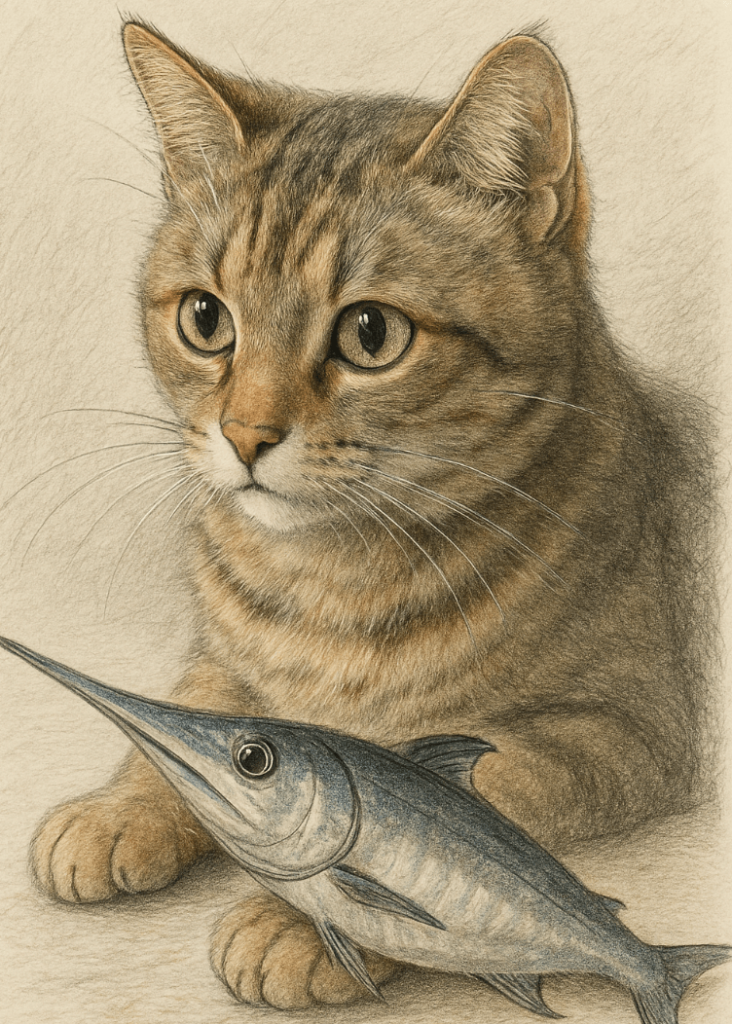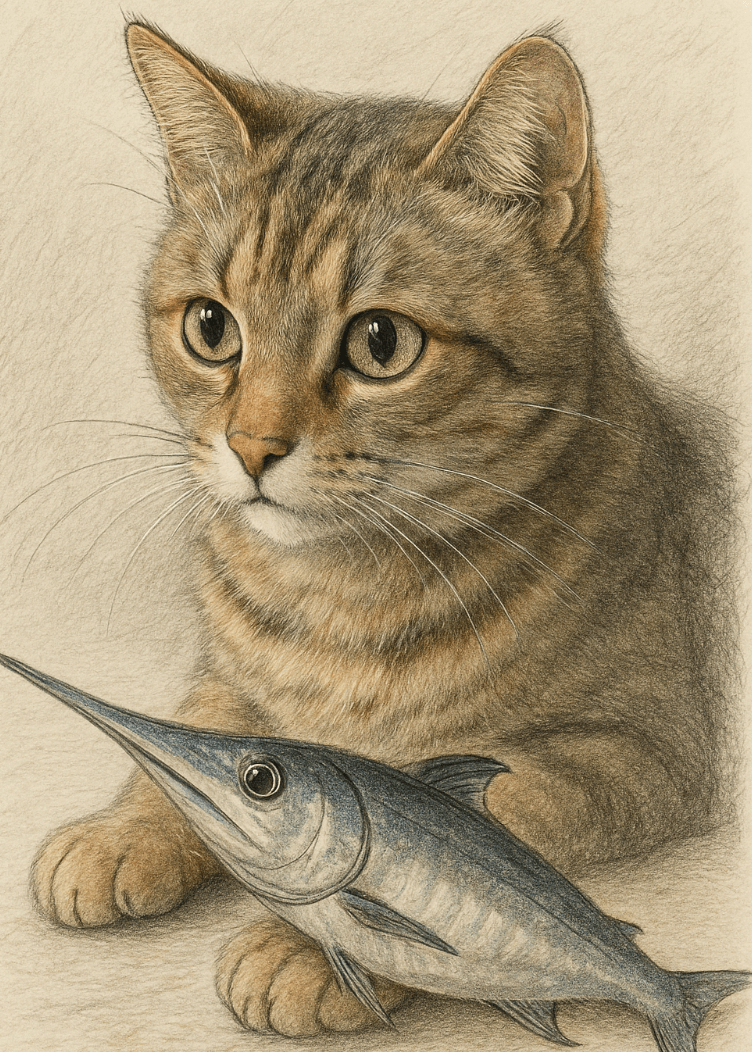Can Cats Eat Swordfish? What You Need to Know
When it comes to feeding our feline friends, many pet owners wonder whether exotic fish like swordfish are safe for cats. Cats are obligate carnivores, meaning they thrive on a diet rich in animal protein, but not all types of fish are suitable for their sensitive digestive systems. Swordfish, known for its firm texture and mild flavor, might seem like a tempting treat, but there are important considerations to keep in mind before sharing it with your cat. In this blog post, we’ll explore the potential benefits, risks, and expert tips for feeding swordfish to your furry companion, ensuring their health and happiness remain a top priority.
Potential Risks of Feeding Swordfish to Cats
While swordfish can be a source of protein, it also poses several risks that every cat owner should be aware of. These hazards can range from nutritional imbalances to serious health issues.
High Mercury Content:
Swordfish is known to contain high levels of mercury, which can accumulate in a cat’s system and lead to toxicity over time.Rich Fat Content:
The high fat content in swordfish may upset your cat’s stomach, causing vomiting or diarrhea if consumed in excess.Risk of Parasites:
Raw or improperly prepared swordfish can harbor parasites that are harmful to cats and humans alike.Allergic Reactions:
Some cats may develop allergic reactions to new proteins, resulting in itching, swelling, or gastrointestinal distress.Nutritional Imbalance:
Feeding swordfish as a regular part of your cat’s diet can lead to deficiencies in essential nutrients like taurine, which cats cannot produce on their own.
These risks highlight why caution is essential when considering swordfish as a treat for your cat. Always prioritize their safety over curiosity or convenience.
Benefits of Swordfish for Cats (When Fed in Moderation)
Despite the risks, swordfish can offer some benefits for cats when prepared and served responsibly. These advantages are rooted in its nutritional profile, but moderation is key.
High-Quality Protein:
Swordfish is rich in lean protein, which supports muscle development and overall energy levels in cats.Omega-3 Fatty Acids:
These healthy fats promote skin and coat health while supporting brain function and reducing inflammation.Low Carbohydrates:
Unlike processed cat treats, swordfish contains no added carbs, making it a more natural option for your cat’s carnivorous diet.Hydration Support:
Fresh or lightly cooked swordfish can contribute to your cat’s hydration needs, especially if they’re reluctant water drinkers.Variety in Diet:
Introducing occasional novel proteins like swordfish can add variety to your cat’s meals, satisfying their curiosity and taste buds.
While these benefits exist, they must be weighed against the potential dangers to determine if swordfish is truly suitable for your cat.
Check this guide 👉Can Cats Eat Garlic Bread? Best 7 Expert Tips!
Check this guide 👉Can Cats Eat Flan? Best 7 Expert Tips!
Check this guide 👉Can Cats Eat Monstera? Best 7 Expert Tips!

Safe Alternatives to Swordfish | Risks of Unsafe Fish Choices |
|---|---|
Cooked salmon (low-mercury options) | High-mercury fish like tuna or marlin |
Sardines in water (no salt added) | Raw or undercooked fish |
Lightly cooked shrimp | Fish with bones or sharp fragments |
Boneless, skinless cod | Fish seasoned with spices or oils |
Freeze-dried fish treats | Processed fish products with additives |
How to Safely Feed Swordfish to Your Cat
If you decide to give your cat swordfish, it’s essential to take precautions to minimize risks. Follow these guidelines to ensure a safe experience.
Choose Low-Mercury Portions:
Opt for smaller cuts of swordfish that are less likely to contain high mercury levels compared to larger steaks.Cook Thoroughly:
Always cook swordfish thoroughly without adding salt, spices, or oils, as these can upset your cat’s stomach.Remove Bones and Skin:
Ensure all bones and skin are removed to prevent choking hazards or digestive blockages.Limit Portion Sizes:
Offer only small amounts as an occasional treat, never as a staple food or daily meal.Monitor for Adverse Reactions:
Watch your cat closely after feeding swordfish for signs of allergies, digestive upset, or other issues.
By following these steps, you can mitigate risks while allowing your cat to enjoy the occasional bite of swordfish safely.
Signs Your Cat May Be Struggling with Fish Consumption
Even with precautions, complications can arise if your cat consumes unsuitable fish like swordfish. Watch for these warning signs to act quickly if something goes wrong.
Vomiting or Diarrhea:
These symptoms may indicate that your cat has ingested something harmful or is struggling to digest the fish.Lethargy or Weakness:
A sudden lack of energy or difficulty moving could signal mercury poisoning or another toxic reaction.Loss of Appetite:
If your cat refuses to eat after consuming fish, they may be experiencing nausea or discomfort.Pawing at the Mouth:
This behavior often indicates that your cat is experiencing pain or irritation from sharp bone fragments or seasoning.Skin Irritation or Itching:
Allergic reactions to fish can manifest as redness, swelling, or excessive scratching around the face or ears.
Recognizing these signs early allows you to seek veterinary care promptly, preventing further complications.
Common Mistakes to Avoid When Feeding Fish to Cats
Many pet owners unintentionally make mistakes when introducing fish into their cat’s diet. Here are some pitfalls to watch out for.
Feeding Raw Fish:
Raw fish can contain harmful bacteria or parasites that pose serious health risks to cats.Using Seasonings or Oils:
Adding salt, garlic, or cooking oils can irritate your cat’s stomach and cause long-term health issues.Overfeeding Fish:
Too much fish can lead to nutrient imbalances, particularly a deficiency in taurine, which is vital for heart and eye health.Ignoring Mercury Levels:
Not all fish are created equal—high-mercury varieties like swordfish or tuna should be avoided entirely.Neglecting Veterinary Advice:
Skipping a professional opinion can result in unknowingly harming your cat with inappropriate food choices.
Avoiding these mistakes ensures a safer and healthier experience for your cat.
Alternatives That Mimic the Benefits of Swordfish
If you’re hesitant about feeding swordfish, there are plenty of alternatives that mimic its benefits without the associated risks.
Cooked Salmon:
Rich in omega-3 fatty acids, cooked salmon is a safer and more nutritious option for cats.Sardines in Water:
These tiny fish are low in mercury and packed with essential nutrients, making them an excellent occasional treat.Bone Broth:
Strained, sodium-free bone broth offers hydration and nutrients without the dangers of whole fish.Freeze-Dried Fish Treats:
Designed for cats, these treats provide the taste and benefits of fish in a controlled, safe format.Fish-Based Commercial Foods:
High-quality wet cat foods made with fish are formulated to meet your cat’s dietary needs without the risks of raw or whole fish.
These alternatives allow you to cater to your cat’s instincts while keeping them safe.
Understanding Your Cat’s Natural Instincts Around Fish
Cats are naturally drawn to fish because of their evolutionary history as hunters. Understanding their instincts helps explain their fascination.
Strong Sense of Smell:
Cats have an acute sense of smell, and the aroma of fish is particularly enticing to them.Craving Omega-3 Fatty Acids:
Fish contains nutrients that support brain and eye health, which cats instinctively seek out.Curiosity About Texture:
The soft, flaky texture of cooked fish appeals to cats’ preferences for tender, easy-to-eat foods.Territorial Behavior:
Cats may become possessive of fish treats, viewing them as valuable resources worth guarding.Playful Exploration:
Cats use their paws and mouths to investigate new textures, and fish provides an intriguing sensory experience.
By recognizing these behaviors, you can better address your cat’s needs in a safe and controlled manner.
Frequently Asked Questions About Cats and Swordfish
Is swordfish safe for cats to eat?
While small amounts of cooked, boneless swordfish are generally safe, the high mercury content makes it a risky choice.
How much swordfish can I give my cat?
Limit portions to a teaspoon-sized amount once a month at most, and always monitor for adverse reactions.
What are safer fish options for cats?
Low-mercury fish like salmon, sardines, or cod are better alternatives when prepared properly.
Can kittens eat swordfish?
Kittens should avoid swordfish entirely due to their developing immune systems and higher sensitivity to toxins.
What should I do if my cat shows signs of illness after eating swordfish?
Contact your veterinarian immediately to assess the situation and provide appropriate treatment.
Prioritizing Your Cat’s Health When Offering Swordfish
Feeding swordfish to your cat can be a double-edged sword, offering both nutritional benefits and significant risks. While it provides high-quality protein and omega-3 fatty acids, the dangers of mercury toxicity and digestive upset cannot be ignored. By understanding the potential hazards, choosing safer alternatives, and consulting your veterinarian, you can ensure your cat stays healthy and happy. Remember, your feline friend relies on you to make the best dietary choices for them—so always prioritize their well-being above all else.
Do Cats Have Taste Buds? Best 7 Expert Tips! – Discover how cats experience flavors and why their taste is so unique.
Do Dogs Have Taste Buds? Best 7 Expert Tips! – Discover how dogs experience taste, their preferences, and what it means for their diet and health.
Can Cats Taste Sweet? Best 7 Expert Tips! – Discover why cats can’t taste sweetness, how it affects their diet, and tips to keep them healthy and happy.
Can Dogs Taste Sweet? Best 7 Expert Tips! – Discover how dogs perceive sweetness, which foods are safe, and tips to manage their sweet cravings responsibly.





